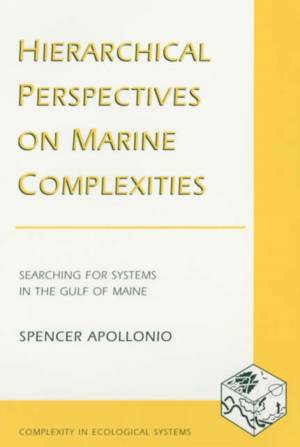
Bedankt voor het vertrouwen het afgelopen jaar! Om jou te bedanken bieden we GRATIS verzending (in België) aan op alles gedurende de hele maand januari.
- Afhalen na 1 uur in een winkel met voorraad
- In januari gratis thuislevering in België
- Ruim aanbod met 7 miljoen producten
Bedankt voor het vertrouwen het afgelopen jaar! Om jou te bedanken bieden we GRATIS verzending (in België) aan op alles gedurende de hele maand januari.
- Afhalen na 1 uur in een winkel met voorraad
- In januari gratis thuislevering in België
- Ruim aanbod met 7 miljoen producten
Zoeken
Hierarchical Perspectives on Marine Complexities
Searching for Systems in the Gulf of Maine
Spencer Apollonio
€ 84,95
+ 169 punten
Omschrijving
The Gulf of Maine supports a vital fishery for North America and is one of the most intensely studied marine ecosystems in the world. An understanding of its ecology has practical applications to management of other marine systems and fisheries. This book is the first application of Hierarchy Theory to the ecological workings of the Gulf of Maine and of marine ecosystems in general. Hierarchy Theory offers a perspective that simplifies the apparent complications and contradictions of ecosystems, which encompass a number of scales of time (from minutes to decades or longer) and of space (from centimeters to kilometers). Spencer Apollonio explores in detail the idea of natural constraints inherent in hierarchical ecosystems and the impact upon such systems when constraints are reduced or removed. He argues that conventional fisheries management, which practices the removal of these constraints, may be doomed to failure. Apollonio focuses in particular on the "groundfish crisis" in the Gulf, the precipitous decline due to overfishing in populations of cod, haddock, pollock, hakes, and various types of flounders, which have together constituted the mainstay of the Maine fishing industry for centuries. Hierarchical Perspectives on Marine Complexities presents a compelling case for a new approach that holds the promise of resource sustainability in the face of enormously complicated natural and cultural forces.
Specificaties
Betrokkenen
- Auteur(s):
- Uitgeverij:
Inhoud
- Aantal bladzijden:
- 320
- Taal:
- Engels
- Reeks:
Eigenschappen
- Productcode (EAN):
- 9780231124898
- Verschijningsdatum:
- 30/10/2002
- Uitvoering:
- Paperback
- Formaat:
- Trade paperback (VS)
- Afmetingen:
- 168 mm x 216 mm
- Gewicht:
- 335 g

Alleen bij Standaard Boekhandel
+ 169 punten op je klantenkaart van Standaard Boekhandel
Beoordelingen
We publiceren alleen reviews die voldoen aan de voorwaarden voor reviews. Bekijk onze voorwaarden voor reviews.









